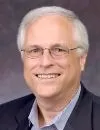At a recent gathering, members of the Overseas Marylanders Association (OMA)—faculty and staff who worked for University of Maryland Global Campus (UMGC) outside the United States—came together for three purposes. They wanted to honor servicemembers on Veteran’s Day, toast a new university gallery dedicated to Asian art and get an update on the state of the university from UMGC President Greg Fowler.
But mostly OMA members at the Nov. 11-12 gathering did what they like best: share stories about their unusual experiences as professors who traveled the world to teach military personnel on bases—and even in war zones.
“My challenge was to create a positive learning environment for everyone, regardless of logistics or location,” said Hugo Keesing, who spent four years teaching overseas, first as a 26-year-old psychology teacher in Vietnam in 1970 and then at European bases. “Some classes had to be held in a Quonset hut or an elementary school classroom with kiddie-sized furniture or in a recreation center with only a screen between us and the pool tables. No one complained.”
Keesing, a long-haired anti-war activist assigned to teach soldiers risking their lives for their country, had landed in Vietnam with some trepidation. Many of the men he taught were draftees who, he said, may have had “some less-than-successful college experience” but now were determined to make the most of the opportunity the university provided.
Keesing noted that class discussions could get interesting. For example, his students discussed the 1960s experiments of Yale University psychologist Stanley Milgram, who examined the conflict between personal conscience and obedience to authority. Milgram’s research grew out of the Nuremburg trials, during which Nazis accused of genocide said they were just following orders.
“In Vietnam, when I assigned students to compare Milgram’s controversial work on ‘blind obedience’ to the ongoing war, they didn’t protest to their chain of command,” Keesing said. “Rather, they engaged in spirited discussion.”
Keesing taught a broad range of servicemembers. Depending on where he was assigned, a student might be a combat pilot, a flightline mechanic, a nurse or even a linguist working on intelligence linked to electronic systems, he explained.
“I learned as much from them as I hope they learned from me,” he said.
OMA festivities to mark the opening of the Emory Trosper collection of Asian art paid tribute to one of their own whose personal collection forms the foundation for the gallery. Trosper amassed an impressive Japanese and Chinese art collection during his 33 years in UMGC’s Far East Division, mostly in Tokyo. Julian Jones, who became director of the division in 1981, recalled Trosper serving as the go-to person for new faculty and staff.
“He became the local Maryland expert on many aspects of Japanese life and culture,” Jones explained.
Much of Trosper’s art collection was anchored by Sosaku Hang, a new style of woodblock printing after World War II that combined Western Post-Impressionism and traditional Japanese art forms. He even arranged for a master artist in the genre, Yoshitoshi Mori, to receive an honorary UMGC degree.
In the early days of the art form, Sosaku Hang prints could be had for next to nothing. They were even sold in PX stores on American bases, Jones said, and they decorated UMGC’s offices in Tokyo. By the 1990s, however, their value rose dramatically and artists in that field were spotlighted in great museums of the world.
Trosper donated works in his collection over time to UMGC’s arts program, which now focuses on works by artists from Maryland and Asia. Trosper’s generosity inspired other UMGC veterans of the Far East Division, including former university Chancellor Ray Ehrensberger and former university President T. Benjamin Massey and his wife, Bylee, to donate their collections.
Jones said UMGC’s Asian collection now numbers 150 prints, including 28 added this year. Trosper’s art makes up about half the collection.
Joe Arden offered a toast to the gallery’s namesake. Many OMA members’ hands went up when asked how many had known Trosper personally.
“It will surprise none of you when I describe [Trosper] as the consummate gentleman, a more gracious person would be difficult to find anywhere,” said Arden, who met Trosper in 1967. Arden had joined UMGC’s Asia program shortly after Trosper became an administrator.
Fowler, who provided the OMA gathering with an update on UMGC, noted that the university exists today because of early faculty members’ work in building UMGC’s reputation at the Department of Defense. That legacy, he said, is quality education for U.S. military personnel anywhere in the world.
“You built this,” Fowler said. “I feel like we’re caretaking and, hopefully, taking to the next level the work that you have done over that period of time.”
Fowler told the OMA members that the COVID epidemic pushed higher education into providing online education, an area pioneered by UMGC. Prior to the pandemic, he said, about 30 percent of higher education institutions offered online experiences. Since the pandemic, it has grown to 80 percent.
The president said UMGC has identified three priorities to maintain its leadership in virtual learning. It will focus on skills and abilities that will pay off for students in the workplace. It will develop and streamline new processes to award credit for learning that happens outside the classroom, including on the job and in the military, in order to reduce the number of classroom hours needed for graduation. And, finally, it will foster high quality learning experiences that respond to the needs of both learners and employers.
UMGC still maintains overseas programs, but they have shrunk as the U.S. military returns its personnel to U.S. bases. Lloyd Miles, UMGC senior vice president for Global Military Operations, noted that the university has combined European, Asian and stateside operations to ensure students have the same experience no matter where they are based.
“Our reputation overseas within the military community is second to none,” Miles said. “We really owe that to the folks in this room.”

Share This